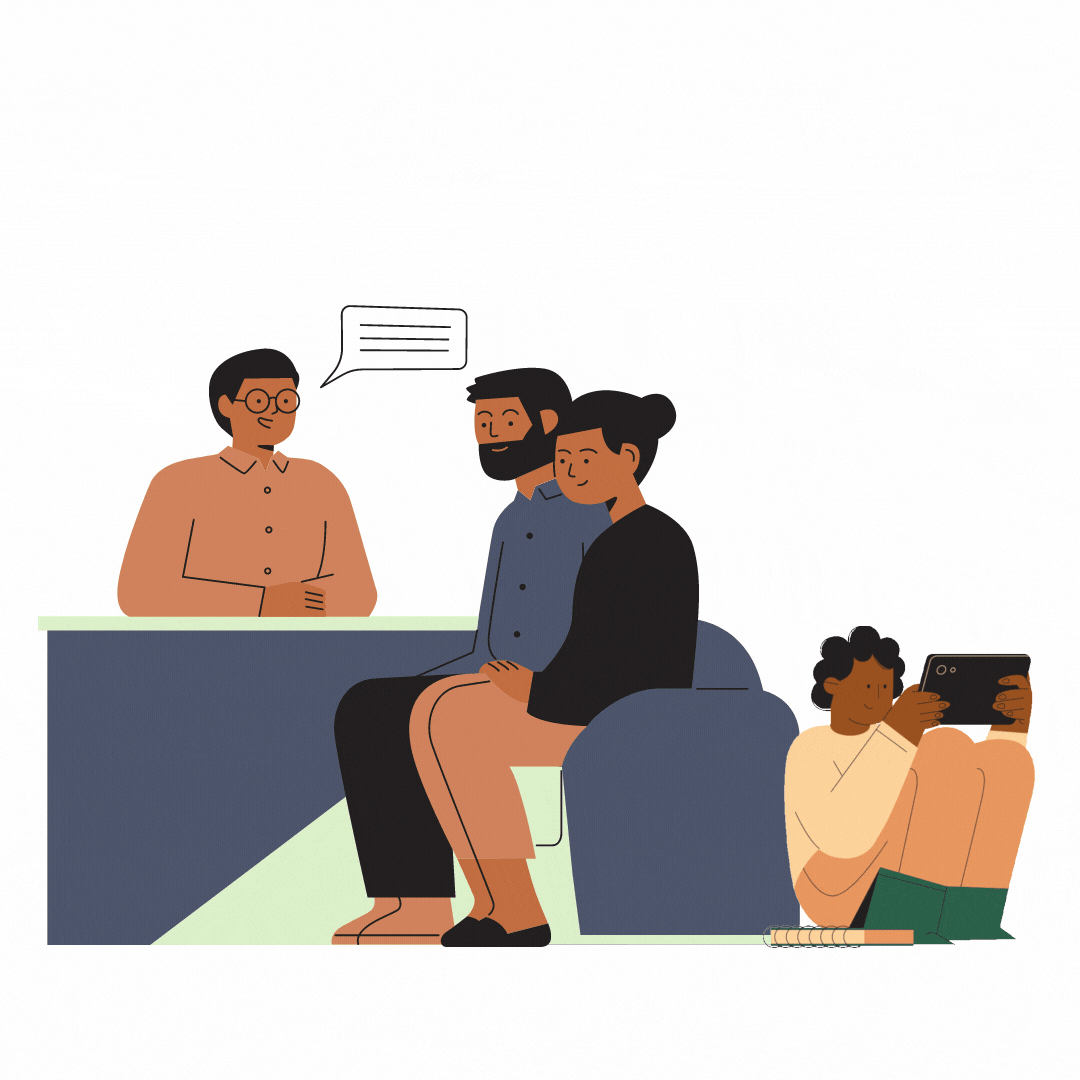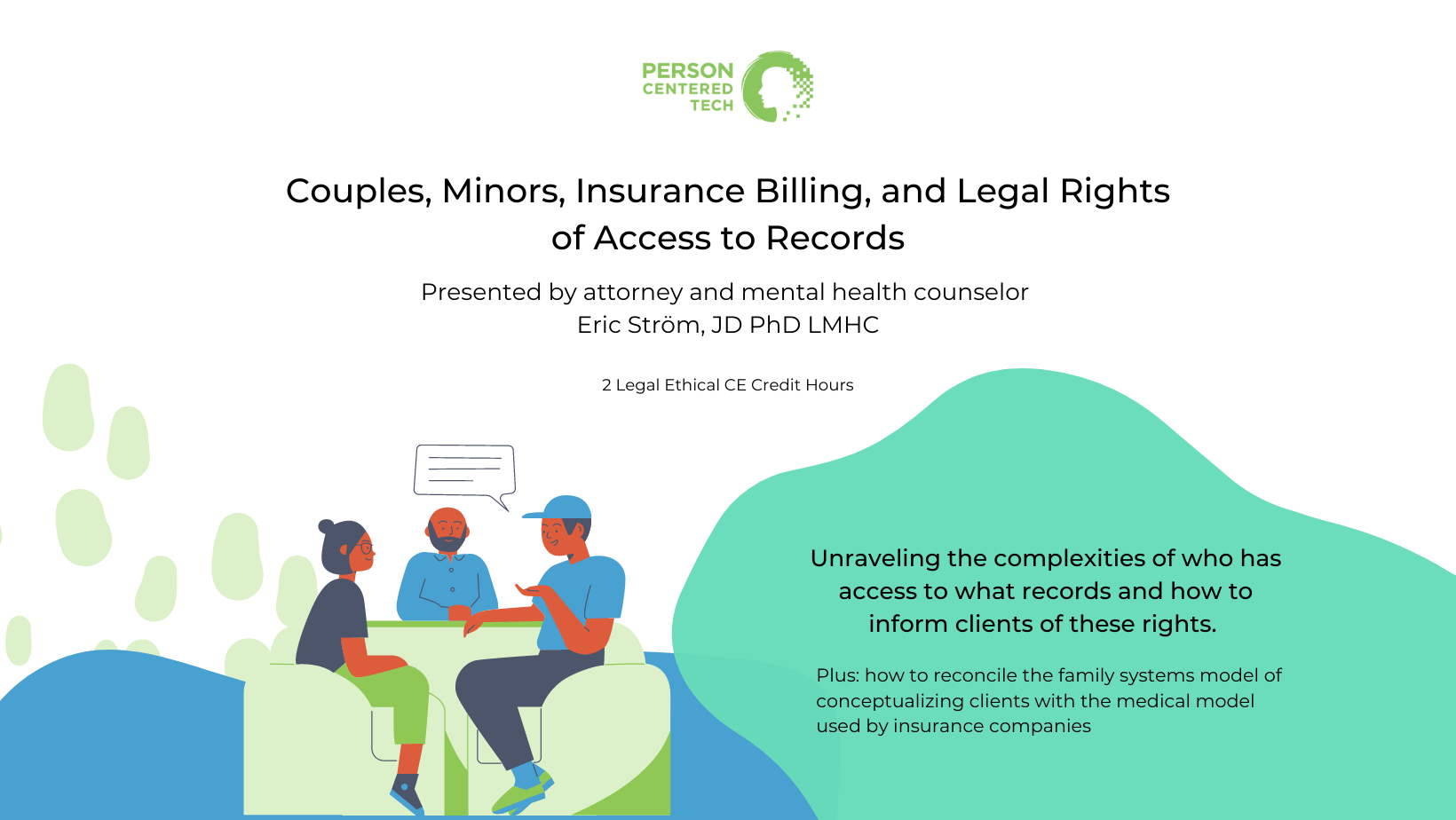On-demand 2 Legal-Ethical CE Credit Hours Self Study Course on Rights of Access and Insurance Billing with Couples and Minors in Therapy
Couples, Minors, Insurance Billing, and Legal Rights of Access to Records
2 legal-ethical CE credit hours
On Demand Self Study

Couples therapy, family therapy, and working with minors all get complex enough without even considering the struggle of determining who has access to what records.
What’s more, for those of us who employ a Family Systems approach to therapy, working within the medical model of 3rd-party payers introduces the wrinkle of choosing a single, individual “Identified Patient” within the couple or family we’re working with.
Attorney and mental health counselor Eric Strom, JD PhD LMHC will help us navigate these complexities. Eric has been both a therapist and an attorney and consultant to therapists, for many years. In this program, he will help unravel the messy situation of determining who has access to what records and how we need to inform clients of their rights. And he will provide some strategies for reconciling the family systems model of conceptualizing clients with the medical model used by insurance companies.
Who is this event for?
This presentation for Counselors, Clinical Social Workers, Marriage and Family Therapists, and Psychologists in both solo and group practice settings will discuss vital legal-ethical issues that arise in couples counseling, family therapy, and when working with minors. This presentation is suitable for both solo practitioners and group practice leaders, and it is relevant for practices that are 100% in-person, 100% telehealth, and a mixture of both.
 In-person Practices
In-person Practices
 Hybrid Practices
Hybrid Practices
 Teletherapy Only Practices
Teletherapy Only Practices


Rights of Access in Tricky Situations
Describe how rights of access to records work within the context of therapy with multiple clients, e.g. couples, and with minors
Identified Patient Considerations
Describe how rights of access to records are affected by the designation of an Identified Patient, such as in couples or family therapy
Practical Strategies
Reconcile the medical model with family systems models for providing care so as to ensure that couples and family therapy provided within the context of managed care remains legal and ethical
PCT IS MY GO TO RESOURCE for my new fully Teletherapy practice. You all continue to impress on the comprehensive and up-to-date, not to mention user-friendly tools and information you provide to therapists etc like myself.

The Benefits of the Self Study Course
.
This presentation is created to help clinicians navigate the, often tricky, aspects of rights of access and insurance billing when working with minors and couples.
The self study course is designed to help clinicians integrate and absorb the information presented. Each module is created in a way that helps clinicians practically apply the information in their work (and helps facilitate change management as clinicians understand the aspects needed to implement the tools provided)
- Built with androgogical principles
- Learning exercises to help integrate the new information
- Practical application knowledge provided by other mental health professionals tailored to real world practice settings so that you can apply your learning right away
PCT gifts the self study of this course to everyone who purchases it for the suggested price or more.
Course Details
This presentation for Counselors, Clinical Social Workers, Marriage and Family Therapists, and Psychologists in both solo and group practice settings will discuss vital legal-ethical issues that arise in couples counseling, family therapy, and when working with minors. This presentation is suitable for both solo practitioners and group practice leaders, and it is relevant for practices that are 100% in-person, 100% telehealth, and a mixture of both.
Title: Couples, Minors, Insurance Billing, and Legal Rights of Access to Records
Authors/Presenters: Eric Strom, JD PhD LMHC; Roy Huggins, LPC NCC
CE Length: 2 CE hour
Legal-Ethical CE Hours: 2 legal-ethical CE hour
Educational Objectives:
- Describe how rights of access to records work within the context of therapy with multiple clients, e.g. couples, and with minors
- Describe how rights of access to records are affected by the designation of an Identified Patient, such as in couples or family therapy
- Reconcile the medical model with family systems models for providing care so as to ensure that couples and family therapy provided within the context of managed care remains legal and ethical
Syllabus:
- Clients’ right to access their records
- HIPAA vs. State Law
- Minors
- Identifying the client & access to records
- Family systems model vs medical model
- 3rd Party Payers
- Applying client access rights
- Informing clients/participants
- Confidentiality in subsystem work
- Reconciling family system and medical models
Additional Information
Citations:
-
- US Dept. of Health and Human Services. (2006). HIPAA Administrative Simplification. Washington, DC: Author.
- US Dept. of Health and Human Services. (2013). HIPAA Omnibus Final Rule. Washington, DC: Author.
Accuracy, Utility, and Risks Statement: This program discusses strategies for complying with HIPAA and possibly some state rules. It may not include information on all applicable state laws. Misapplication of the materials, or errors in the materials, could result in non-compliance with applicable laws or ethics codes.
Conflicts of Interest: None stated
Commercial Support: None
Meet Our Presenters
Presented by Eric Strom, JD PhD LMHC with Roy Huggins LPC, NCC

Eric Ström JD PhD LMHC,
is an attorney and Licensed Mental Health Counselor in Seattle, Washington. As an attorney, Eric provides legal counsel, consultation, and guidance to mental health professionals. Eric’s counseling practice is focused on providing counseling services to combat veterans as well as providing supervision and consultation to other clinicians. Eric currently serves on the American Mental Health Counselors Association Ethics Committee, and is the ethics advisor for the Washington Mental Health Counselors Association. Eric has taught a range of courses in counseling and professional ethics at a variety of graduate and undergraduate programs.
Eric earned a PhD in Counselor Education and Supervision at Oregon State University, a Master of Arts Degree in Counseling Psychology from the Northwest School of Professional Psychology at Argosy University Seattle, graduated cum laude from Wayne State University School of Law in Detroit Michigan, attended the Hague Academy of International Law in the Hague Netherlands, and received a Bachelor of Arts degree in Linguistics from the University of Michigan.

Roy Huggins, LPC NCC, is a counselor in private practice who also directs Person-Centered Tech. Roy worked as a professional Web developer for 7 years before changing paths and makes it his mission to grow clinicians’ understanding of the Internet and other electronic communications mediums for the future of our practices and our professions.
Roy is an adjunct instructor at the Portland State University Counseling program where he teaches Ethics and is a member of the Zur Institute advisory board. He has acted as a subject matter expert on HIPAA, security, and clinical use of technology for Counseling licensure boards, and both state and national mental health professional organizations. He has co-authored or authored 2 book chapters, and he routinely consults with mental health colleagues on ethical and practical issues surrounding tech in clinical practice. He served for 5 years on the board of the Oregon Mental Health Counselors Association and then the Oregon Counseling Association as the Technology Committee Chair.
He really likes this stuff.
